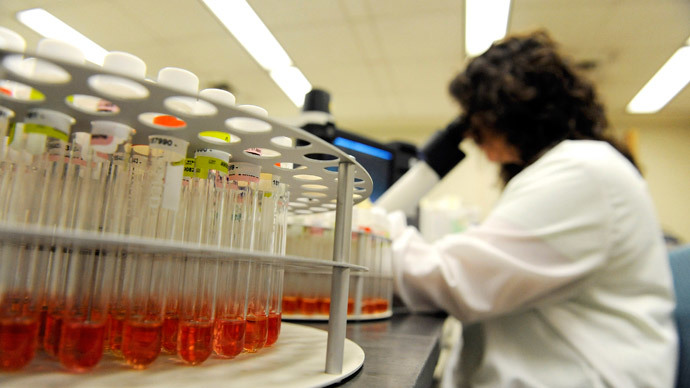GM bacteria ‘sensors’ could detect cancer, diabetes

Scientists have published two studies describing how genetically modified bacteria could help detect cancerous tumors and diabetes in mice, and potentially be used as a diagnostic tool for humans.
The first study, which was published in the journal Science Translational Medicine, reveled how scientists had modified E. coli bacteria and transformed it into a sort of living sensor, which could stay in a mouse’s body for up to a month and detect tumors inside its body.
Typically E. coli is able to pass through the gut walls and colonize liver tumors, but scientists modified the bacteria to produce an enzyme which changes the color of a mouse’s urine, as an early warning system. Although in mice the genetically modified E. coli showed visible evidence of cancerous tumor presence within 24 hours, the method will have to be proven to work in humans, whose gut microbiomes are very different from those in mice.
READ MORE: Osteoporosis drug protects bones from breast cancer metastasis – study
In the second study researchers used the bacteria to look for glycosuria in humans, the presence of sugar in urine, which is a sure sign of uncontrolled diabetes. The E. coli bacteria turned urine red in 89 percent of cases where glycosuria was present and suggested diabetes was present when in fact it was not in just 3 percent of cases.
The study’s researchers are working on liver cancer at the Massachusetts Institute of Technology and UC San Diego, and diabetes at University of Montpellier in France and Stanford University. They say their works are crucially important in improving the diagnosis and treatment of diseases, which can go undetected for some time.
The new studies “elegantly merge the promise of synthetic biology with very practical and clinical applications in biosensors,” director of the National Institute of Biomedical Imaging and Bioengineering's program in synthetic biology for technology development, Jessica Tucker, told the LA Times. The bacteria “sensors” could one day allow doctors in remote clinics to easily diagnose and then monitor the treatment of a number of diseases.












